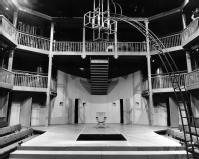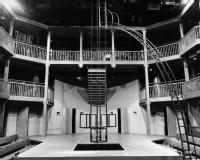Doctor Faustus 1989 - RSC
Joe Cocks Studio Collection © Shakespeare Birthplace Trust
|
'Barry Kyle's production of Marlowe's Dr Faustus at the Swan Theatre, Stratford-upon-Avon takes an enormous risk with pace. It goes slowly but inexorably, rejecting a slapstick approach to the difficult burlesque middle scenes. The risk is worth taking: from an opening in which a chorus of damned souls boils up out of hell, to the moment when Faustus is delivered to his judgement, the language is paramount. Ashley Martin-Davis's designs are austere in the extreme. Faustus's world is essentially monochromatic: the chorus of the damned, who disperse to play the various parts, and then are subsumed again into the chorus, provide the fitful colour and harrowing comedy. The choreography of the Seven Deadly Sins, largely mimed by the chorus functioning as a single organism, is effective: no medieval masks, but body language. At every point Kyle stresses the sensual reality of Faustus's fantasy, the sterility of his contract, and his early sense that he has short-changed himself with trivial powers. He also underlines the theme of sacrifice to great effect.' Michael Schmidt, 'Taking risks in hell', Daily Telegraph, 12 May 1989'[A] stirring revival by Barry Kyle [...] one that makes the prospect of eternal damnation an unnerving, conscious-pricking reality. Mr Kyle's conceit is to suggest that the whole action takes place not just in Faustus's bare, grey-walled study (good set by Ashley Martin-Davis) but in the dark reaches of his imagination. It begins with the resonant cry of a soul in torment and the conjuration of writhing, half-naked, all-male apparitions from a sunken pit. These nine revenants become in turn a watching chorus, medieval scholars, good and bad angels and creatures of historical legend. This not only gives the production (2 1/4 hours without interval) visual unity. It also implies that there is a strong element of masturbatory fantasy about Faustus's visions. The other governing idea is that Faustus seems to sum up the essential human predicament: the desire to experience everything while still entertaining the possibility of salvation. Gerald Murphy's here, blond, stocky and plausibly base-born, early on sums up his achievements and then lets out a cry of despair on "Yet art thou still but Faustus and a man." What he is clearly doing is hallucinating about both the boys and fears of omnipotence. Thus his metamorphosing accolytes suddenly turn from robed scholars into red devils who claw and caress his body as in an erotic dream. And the Seven Deadly Sins, instead of being a cabaret turn by Breughel, are like a rugby scrum with each vice emerging from the pack. It is inventive and ingenious precisely because it relies on the Brook principle of creating magic from the resources on stage.' Michael Billington, 'Just what the doctor ordered', The Guardian, 12 May 1989
|


